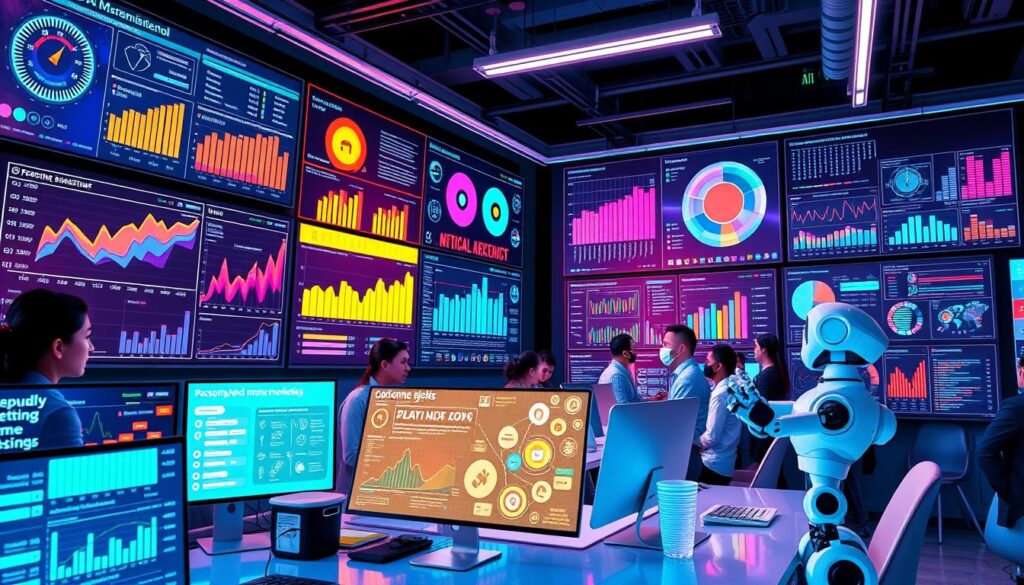Did you know 64% of marketing pros already use AI tools? And 21% use AI a lot in their work? This shows how fast AI is changing marketing. AI is now used for things like data analysis and making content.
If you own a business and want to learn about AI, this guide is for you. It will help you see how AI can change your marketing. Using AI can help you understand your customers better, work more efficiently, and connect with them in new ways.
Key Takeaways
- AI helps understand customers by analyzing lots of data for personalized experiences.
- AI tools for marketing can make things more efficient and save money.
- AI makes it easier to connect with customers through insights and automation.
- Using AI can save business people about two hours and 24 minutes a day.
- AI helps in placing ads better and targeting them to get more return on investment.
This guide is just the beginning of learning about AI in marketing. We’ll explore how AI works in marketing, its benefits, and how to use it in your strategies.
Understanding AI in Marketing
AI has changed how businesses plan their marketing. It uses machine learning and automation to analyze lots of data. This leads to smarter and more effective marketing choices. Let’s explore how AI can help in marketing campaigns.
What is AI in Marketing?
AI in marketing uses algorithms and machine learning to automate tasks. It personalizes customer experiences and analyzes data better. By using AI, businesses can predict what customers want and improve their strategies.
Google offers AI tools to help businesses grow and work more efficiently. This makes it easier to see quick improvements.
Types of AI Applications
There are two main types of AI in marketing: predictive and generative. Predictive AI looks at data to guess what will happen next. This helps businesses know what customers might want.
Generative AI, on the other hand, creates new content based on patterns. This includes things like email drafts and ads.
Recent studies show that 58% of marketers using generative AI for content have seen better results. This AI makes content more personal and engaging. For example, Carrefour uses AI to quickly make marketing campaigns based on past data and brand rules.
Current Trends and Future Potential
AI in marketing is showing great promise for the future. Companies like PepsiCo and Vans are using AI to connect better with customers and boost sales. PepsiCo is building stronger relationships with consumers through AI, while Vans saw a big jump in sales and conversions during the holidays.
Les Mills also saw a huge increase in sign-ups and a better cost per trial with AI. These stories highlight AI’s power in marketing. It’s a key tool for businesses looking to stay ahead and be creative.
Benefits of Implementing AI in Marketing
Using AI in marketing offers many advantages. It changes how your business talks to customers and improves strategies. Let’s look at the main benefits of AI in marketing.

Enhanced Customer Understanding
One big benefit of AI in marketing is understanding customers better. AI tools like natural language processing (NLP) and machine learning look at lots of data. They find out what customers like and how they behave.
This info helps you make your marketing better. A Persado survey showed marketers got it right only 30% of the time. This shows AI is key for better targeting and personalization.
Improved Efficiency and Cost Savings
AI also makes marketing more efficient and saves money. It automates tasks that take up a lot of time. This means you can do more important things.
For example:
- AI chatbots answer customer questions 24/7 without needing a human.
- Programmatic ads place ads based on what customers do, leading to better results.
- Integrated machine learning apps learn from interactions, needing less human help and giving better results.
These changes help you save money and work more efficiently. Marketing teams can then focus on creative and strategic work.
Personalization and Customer Engagement
AI also helps make marketing more personal and engaging. With 71% of customers wanting personalized experiences, AI is key. AI tools use customer data to make marketing campaigns that really speak to people.
For example:
- Personalized messages and offers based on what users do can really boost sales.
- AI helps segment customers better, making ads more relevant and engaging.
- Programmatic ads show the right ads to the right people at the right time.
By using AI in marketing, businesses can make experiences that really connect with customers. This builds stronger relationships and keeps customers engaged.
Getting Started with AI for Marketing
Starting with AI in your marketing means picking the right tools for your goals. A good plan helps you use AI well, making your work more efficient and profitable. Here’s how to start.
Choosing the Right AI Tools
When starting with AI for marketing, pick tools that match your needs. Tools like Jasper.ai for writing, Adcreative.ai for ads, and Pictory.ai for videos help a lot. They do boring tasks and give you insights, making your work easier.
Think about these when picking an AI tool:
- Functionality: Find tools that meet your marketing needs well.
- Scalability: Make sure the tool can grow with your business.
- User-Friendliness: Choose tools that are simple to use, so your team can learn fast.
- Cost: Check the price and make sure it fits your budget.
Steps to Integrate AI into Your Marketing Strategy
Starting AI in your marketing needs a plan:
- Assess Your Needs: Figure out where AI can help most, like making emails personal or segmenting customers.
- Choose Suitable AI Technologies: Pick tools based on what you need. For example, Pictory.ai is great for AI videos.
- Train Your Team: Make sure your team knows how to use the AI tools. Give them training and resources.
- Test and Optimize: Start small, check how it works, and then make it better before using it fully.
Case Studies and Examples
Many companies have seen big wins with AI in marketing. For example, AI in emails has boosted revenue by 41% and CTR by 13.44%. Avimee and Amrutam are SMBs that used AI to automate tasks, understand customers better, and connect with their audience more.
Here are some real-world AI successes:
| Company | Application | Results |
|---|---|---|
| Avimee | AI for customer insights | Improved visibility in search results |
| Amrutam | AI-powered task automation | Enhanced customer engagement across multiple channels |
| General Marketing | AI in email personalization | 41% boost in revenue, 13.44% increase in CTR |
For more on using AI in marketing, check out this guide.
Challenges and Considerations
Using AI in marketing can change the game, but it’s not without its hurdles. Marketers must be aware of these challenges to use AI tools wisely.
Data privacy concerns are a big deal. AI collects and analyzes customer data, so keeping it safe is key to earning and keeping trust. The cost and time needed to set up AI systems are also major factors. Building AI requires a lot of money and effort.
There’s also the worry that AI might stifle creativity and undermine human skills. It’s important to use AI and human insight together for a strong marketing plan.
AI’s ethics are another big issue. AI can be biased, affecting marketing, and losing the human touch can push customers away. For instance, 72 percent of business leaders see AI as a plus, but ethics are crucial.
Keeping up with AI’s rapid changes is tough. Marketers must keep learning and improving to use AI well. Companies like Under Armour show how adapting to AI can lead to success.
Starting small with AI and growing as you get better is a smart move. Adobe notes that 47 percent of advanced companies have a clear AI plan. This shows the value of a well-thought-out strategy.
Knowing the common problems helps businesses avoid them. Setting rules for AI use can help keep things safe and fair. With careful planning, AI can help you stay ahead of the competition.
By tackling these challenges, marketers can fully use AI for marketing. Google’s ads with AI get 15 percent more clicks, showing AI’s power when used right.
For more on these challenges and how to overcome them, check out HubSpot’s detailed guide.
Conclusion
AI is changing marketing in big ways, offering many chances to improve customer service and work flow. Salesforce says 84% of marketers use AI now, up from 29% in 2018. This shows how important AI marketing strategies are today.
AI helps with tasks like chatbots, content creation, and data analysis. A study by Epsilon found 80% of people are more likely to buy if they get personalized experiences. This shows AI’s power in making customer interactions better.
As AI gets better, businesses need to keep up and use it wisely. Using AI can bring big changes, like growth and better customer satisfaction. For more tips on using AI for your business, check out this guide on AI marketing strategies. By facing challenges and thinking about ethics, businesses can use AI to their advantage.
